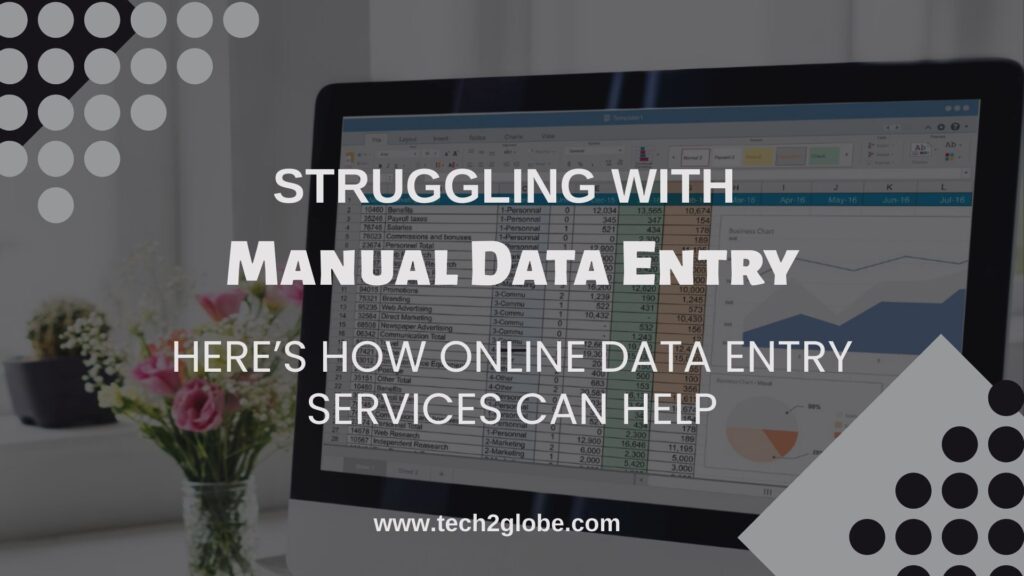
Introduction
The Pain of Manual Data Entry
Have you ever found yourself staring at rows upon rows of data, wondering if there’s a better way to spend your time? Manual data entry is one of those necessary evils that consumes hours, drains productivity, and often leads to burnout. Not only is it repetitive, but it also lacks the kind of value-added impact most modern professionals seek in their work. For businesses, it’s even worse—wasted time, delayed projects, and employees caught up in tasks far below their skillset.
Rise of Online Data Entry Services
In response to this widespread problem, online data entry services have emerged as a powerful, reliable solution. These services take the burden off your shoulders, offering fast, accurate, and secure data management solutions handled by experts. Instead of managing a mountain of spreadsheets or forms, businesses can now outsource the task and get error-free results in record time.
What Are Online Data Entry Services?
Definition and Scope
Online data entry services refer to third-party providers who specialize in entering, organizing, converting, and managing data on behalf of businesses. This work is carried out remotely, using cloud-based tools and secure platforms that allow seamless collaboration between the client and service provider. From simple input tasks to complex data processing and cleansing, these services cover the full spectrum of data entry needs.
Types of Online Data Entry Tasks
Online data entry encompasses a wide variety of tasks, including:
- Typing handwritten or scanned documents into digital formats
- Capturing data from websites and databases
- Data mining and extraction
- Image or PDF to Excel/Word conversions
- Invoice data entry
- CRM database updating
- Data labeling for AI training models
No matter how niche your task is, there’s likely a service out there that specializes in it.
Why Manual Data Entry Is a Problem
Time Consumption
Manual data entry takes up an enormous amount of time—time that could be better spent on strategic or revenue-generating activities. Imagine your sales team spending hours inputting leads into a CRM instead of closing deals. That’s the opportunity cost businesses face every day with manual processes.
Human Error
Mistakes happen—typos, transposed digits, or even missing entries. When you’re working with large datasets, even a small error can snowball into major issues like financial losses, regulatory fines, or lost clients. And let’s not forget how tedious work can cause fatigue, which further increases the error rate.
High Operational Costs
Hiring in-house staff to handle data entry can be expensive. You’re not just paying salaries; you’re also covering training, supervision, office space, and equipment. When these tasks can be done remotely at a fraction of the cost, maintaining an internal team becomes harder to justify.
How Online Data Entry Services Solve These Problems
Automation and Accuracy
One of the key advantages of online data entry services is their use of advanced technology to minimize errors and improve accuracy. Many providers use automation tools and data validation techniques to ensure that the information you receive is clean, consistent, and usable.
Scalability and Flexibility
Online data entry services are built to scale. Whether you’re dealing with hundreds of entries or millions, these providers can adjust quickly to your needs. They offer flexible options for one-time projects or ongoing support, making them ideal for businesses with fluctuating data volumes.
Cost Efficiency
By outsourcing your data entry needs, you eliminate the overheads associated with hiring, training, and managing in-house staff. You also save on infrastructure like computers and office space. This allows you to reallocate resources to departments that directly contribute to growth and profitability.
Key Benefits of Online Data Entry Services
Faster Turnaround Time
Speed is one of the most immediate benefits you’ll notice. Online data entry services often operate across multiple time zones, enabling round-the-clock work. This means your data gets processed faster, and you can make decisions quicker.
Improved Data Accuracy
Experienced professionals, combined with quality assurance checks, ensure data is accurate and reliable. Many providers even have double-entry systems or audit trails to catch and correct discrepancies before they reach you.
Focus on Core Business Activities
With data entry off your plate, you and your team can refocus your time and energy on high-impact areas like customer service, marketing, and product development. It’s a simple change that can dramatically improve your business efficiency.
Who Should Use Online Data Entry Services?
Small Businesses and Startups
For companies with limited manpower, outsourcing data tasks is a smart move. It keeps costs low while ensuring essential admin work gets done without delays.
Enterprises with Large Data Volumes
Big companies deal with vast amounts of information daily. Online data entry services help them manage this data flow without clogging up internal resources or sacrificing quality.
Freelancers and Solopreneurs
If you’re a one-person operation, every minute counts. Letting someone else handle the busywork of data entry means more time for growing your brand and closing new deals.
Industries That Rely on Online Data Entry Services
Healthcare
From patient records to insurance documentation, accurate data entry is vital in healthcare. A single error can affect patient care or lead to legal problems, making outsourcing to professionals a logical step.
E-commerce
Online retailers need to manage SKUs, product descriptions, inventory, and customer data. Mistakes can lead to lost sales or unhappy customers. Online data entry services help keep everything accurate and up to date.
Finance and Insurance
These industries are data-heavy and highly regulated. Errors can cost millions. That’s why many firms rely on specialized providers to handle everything from claim forms to transaction logs.
Real Estate
From listing details to client records and legal documents, real estate agents benefit greatly from outsourcing data management tasks, ensuring smooth transactions and fewer missed opportunities.
Choosing the Right Online Data Entry Service Provider
Things to Look For
When selecting a provider, check for:
- Relevant industry experience
- Transparent pricing
- Data security certifications
- Client testimonials or reviews
- Trial period or sample work
Common Red Flags
Beware of:
- Overpromising results or unrealistic pricin
- Poor communication or slow responses
- Lack of data protection policies
- No clear SLA (Service Level Agreement)
Security and Confidentiality in Online Data Entry
How Data Is Protected
Top providers use encrypted servers, two-factor authentication, VPNs, and role-based access controls to protect sensitive data. You’ll often find regular audits and data protection officers on staff as well.
Compliance with Data Regulations
Reputable online data entry services comply with global standards like GDPR, HIPAA, or ISO 27001. They understand that protecting your data is just as important as processing it.
Real-Life Success Stories
Case Study 1: E-commerce Company
An online fashion retailer outsourced its data entry to focus more on customer experience. The result? Order processing speed increased by 50%, customer satisfaction improved, and internal staff were redirected to creative roles that boosted brand engagement.
Case Study 2: Healthcare Provider
A mid-sized clinic was overwhelmed with paperwork. By outsourcing their data entry, they reduced administrative overhead by 60% and saw faster insurance claim processing, leading to quicker reimbursements.
The Future of Data Entry
AI and Machine Learning Integration
Modern data entry services are integrating AI to automate repetitive tasks and detect anomalies in datasets. This tech enhances speed and reliability, especially for high-volume tasks.
Human Oversight in the Digital Age
While machines are great, they’re not flawless. Human experts remain essential for judgment calls, context-based decisions, and final quality checks. It’s the perfect blend of tech and touch.
Common Misconceptions About Online Data Entry Services
“It’s Just for Big Companies”
Wrong. In fact, small businesses and startups often benefit the most due to limited resources. With affordable packages, it’s accessible to everyone.
“It’s Too Expensive”
On the contrary, many services are priced hourly or per project, making them cost-effective compared to full-time hires. You only pay for what you use.
Tips for Maximizing Online Data Entry Services
Clear Communication
Set expectations from the start. Share detailed briefs, desired formats, and communication channels. The clearer your instructions, the better the results.
Regular Monitoring
Review outputs regularly and provide feedback. Most providers welcome constructive input, which leads to a smoother, more effective partnership.
Conclusion
Manual data entry may seem like a small task, but over time, it snowballs into a major drain on time and resources. Online data entry services offer a simple yet powerful solution to this modern-day bottleneck. They’re fast, accurate, cost-efficient, and adaptable—everything your business needs to thrive in a data-driven world. So why struggle with the old way when there’s a smarter, simpler path right in front of you?
FAQs
Q1: How secure are online data entry services?
Most providers implement advanced security measures like SSL encryption, firewalls, and NDAs to protect your information.
Q2: What is the average turnaround time?
It depends on the task complexity, but many offer 24–72 hour delivery for standard jobs.
Q3: Can I customize the data entry process?
Yes, most services are flexible and will adjust to your formats, templates, or business tools.
Q4: Are these services affordable for small businesses?
Absolutely. Pricing is often based on volume, so you can scale your spending with your needs.
Q5: What file formats do they support?
They handle everything from spreadsheets and PDFs to databases, scanned images, and web-based formats.


